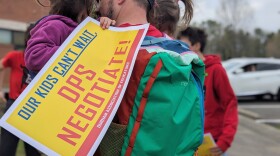Durham鈥檚 ShotSpotter experiment ended Monday night.
The city council rejected a three-year contract for the gunshot detection system by a vote of 4-2. Mayor Leonardo Williams and Mayor Pro-Tem Mark-Anthony Middletdon were the only council members who voted in favor.
A one-year pilot program began in late 2022. Hidden microphones were placed in neighborhoods in east and southeast Durham that would warn police about possible gunfire. found one instance where a ShotSpotter alert may have saved a life, but Duke researchers and the police department say it鈥檚 unclear if the technology reduced gun crime in the city.
Speaking before Monday鈥檚 vote, newly appointed councilmember Chelsea Cook said Durham should focus on crime prevention instead of reacting to gunfire.
"What prevention looks like is holistic," Cook said. "It is mental health services, it is workforce development, it is programming for youth, it is housing, it is art. It is an investment in the community."
Critics on the council, and members of the public who spoke at the meeting, said ShotSpotter disproportionately targeted Black and Brown communities. Williams said those are the areas of the city dealing with the highest levels of gun crime.
鈥淥f course, you're going to get a lot of police response to gunfire in these neighborhoods if the gunshots are happening from those neighborhoods. And that's just a fact,鈥� he said before the vote.
Winston-Salem and Fayetteville have introduced ShotSpotter in the past year. Fayetteville residents have raised similar concerns to people in Durham, especially after the system Chicago ended its contract with ShotSpotter last month.







